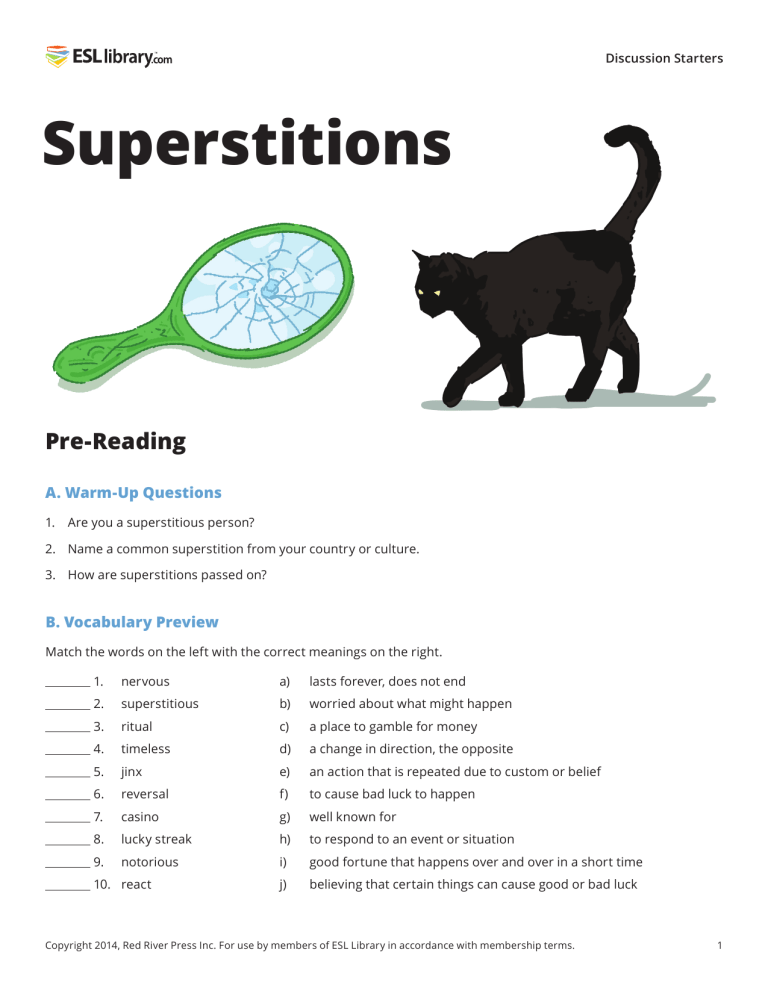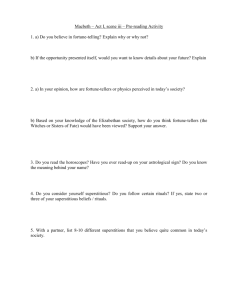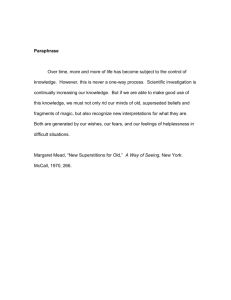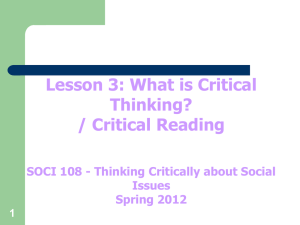
Discussion Starters Superstitions Pre-Reading A. Warm-Up Questions 1. Are you a superstitious person? 2. Name a common superstition from your country or culture. 3. How are superstitions passed on? B. Vocabulary Preview Match the words on the left with the correct meanings on the right. 1. nervous a) lasts forever, does not end 2. superstitious b) worried about what might happen 3. ritual c) a place to gamble for money 4. timeless d) a change in direction, the opposite 5. jinx e) an action that is repeated due to custom or belief 6. reversal f) to cause bad luck to happen 7. casino g) well known for 8. lucky streak h) to respond to an event or situation 9. notorious i) good fortune that happens over and over in a short time j) believing that certain things can cause good or bad luck 10. react Copyright 2014, Red River Press Inc. For use by members of ESL Library in accordance with membership terms. 1 Superstitions Discussion Starters Reading SUPERSTITIONS Would you get married on Friday the 13th? 1. 2. o you avoid walking under ladders? Do black D cats make you nervous? Some people are very superstitious. They carry a lucky charm such as a rabbit’s foot everywhere they go. Why is a rabbit lucky? Because it’s born with its eyes open, of course! here do superstitions come from? Long ago, W people didn’t have the scientific knowledge we do today. To reduce their fear about unexplainable events, people came up with rituals. They passed their beliefs down from generation to generation. Some superstitions are timeless. Floors in buildings still go from the 12th to the 14th floor, even though nobody can agree why the number 13 is unlucky! 3. S uperstitious people think they can turn bad luck away. They “knock on wood” (or, in Britain, “touch wood”) to avoid jinxing themselves. For example, if you say “I’ve never broken a limb” you should immediately search for a table to knock on to avoid a reversal of luck. You may break your leg tomorrow if you don’t! 4. M any superstitions are related to money. For example, if you give money away on Mondays, you’ll give money away all week long. If you leave your purse on the floor, you’ll go broke. Gamblers are notoriously superstitious. If you’re in a casino, never get up to use the washroom. Your lucky streak will go down the toilet! 5. S uperstitions differ from culture to culture. A superstitious African mother won’t cut her baby’s hair before her child’s first birthday! In Mexico, a bride must not wear pearls on her wedding day. Pearls symbolize tears and an unhappy marriage. 6. A re you superstitious? How would you react if someone opened an umbrella in your living room? Comprehension Discuss these questions in pairs and write the answers in your notebook. 1. Why is a rabbit a symbol of luck? 2. Where did superstitions originate? 3. Why does the reading mention the 13th floor of a building? 4. What superstition do some people have about Mondays? 5. What must a Mexican bride NOT do on her “big day”? Copyright 2014, Red River Press Inc. For use by members of ESL Library in accordance with membership terms. 2 Superstitions Discussion Starters Vocabulary Review A. Complete the Sentences Complete the sentences with words from the vocabulary on page 1. 1. Superstitious people feel when a black cat is near. 2. Knock on wood to avoid yourself. 3. If you’re having a lucky at the , don’t get up to use the washroom! 4. M exican brides are They perform many superstitious. on their wedding day. B. Result Clauses C. More Superstitions Create a result clause to go with the “if” clause. Write some more examples of superstitions from your own culture. Share them with your classmates. 1. If you step on a crack, you will break your mother’s back. 2. If you wear pearls on your wedding day, 3. If you walk under a ladder, 4. If you leave your purse on the floor, 5. If you carry a rabbit’s foot everywhere, Discussion Questions 1. here do you think the superstition about W cutting an African baby’s hair came from? 2. When can superstitions be dangerous? 3. What superstition will never die? 4. Which countries or cultures are the most superstitious? Copyright 2014, Red River Press Inc. For use by members of ESL Library in accordance with membership terms. 3 Superstitions Discussion Starters Answer Key LESSON DESCRIPTION: LEVEL: Intermediate Students read about various superstitions and share TIME: superstitions from their own cultures. The lesson includes TAGS: discussion, conditionals, vocabulary review activities and discussion questions. 1.5–2 hours superstitions, Friday the 13th Pre-Reading Vocabulary Review A. WARM-UP QUESTIONS A. COMPLETE THE SENTENCES Have students work in small groups or as a class. 1. nervous 3. streak, casino 2. jinxing 4. notoriously, rituals B. VOCABULARY PREVIEW 1. b 3. e 5. f 7. c 9. g B. RESULT CLAUSES 2. j 4. a 6. d 8. i 10. h Answers will vary. 1. If you step on a crack, you will break your mother’s back. Reading (and/or Listening) 2. If you wear pearls on your wedding day, Read individually, in small groups, or as a class. You can also play 3. the listening as your students read along. A gap-fill version of the reading is available on page 5. Help your students with vocabulary and expressions that they are unfamiliar with. Comprehension 1. A rabbit is a symbol of luck because it’s born with its eyes open. 2. Superstitions originated from having a lack of scientific knowledge. People wanted to protect themselves from the unknown. 3. T he reading mentions the 13th floor of a building because this is an unlucky number, and many buildings skip from 12–14. 4. Some people think that if you give money away on Mondays you’ll give money away all week long. 5. A Mexican bride must not wear pearls on her “big day” because these symbolize tears, which you will have an unhappy marriage. If you walk under a ladder, you will have bad luck for the rest of the day. 4. If you leave your purse on the floor, you will lose all of your money. 5. If you carry a rabbit’s foot everywhere, you will be lucky. C. MORE SUPERSTITIONS Answers will vary. Discussion Questions Answers will vary. *See Discussion Starters Teaching Guide (esl-library.com/discussion) for a variety of ways to use the reading. Audio is available for this lesson. Students can access the audio via our podcast and iTunes. means she’ll have an unhappy marriage. Copyright 2014, Red River Press Inc. For use by members of ESL Library in accordance with membership terms. 4 Superstitions Discussion Starters Listening – Gap Fill (Audio: http://esl-library.com/podcastsuperstitions) Fill in the blanks as you listen to the recording. SUPERSTITIONS Would you get married on Friday the 13th? 1. o you avoid walking under ladders? Do black cats make you D nervous? Some people are very superstitious. They carry a lucky such as a rabbit’s foot everywhere they go. Why is a rabbit lucky? Because it’s born with its eyes open, of course! 2. here do superstitions come from? Long ago, people didn’t have W the scientific knowledge we do today. To reduce their fear about unexplainable events, people rituals. They passed their beliefs down from generation to generation. Some superstitions are timeless. Floors in buildings still go from the 12th to the 14th floor, even though nobody can agree why the number 13 is unlucky! 3. S uperstitious people think they can turn bad luck away. They “knock on wood” (or, in Britain, “touch wood”) to avoid jinxing themselves. For example, if you say “I’ve never broken a limb” you should immediately search for a to knock on to avoid a reversal of luck. You may break your leg tomorrow if you don’t! 4. M any superstitions are to money. For example, if you give money away on Mondays, you’ll give money away all week long. If you leave your purse on the floor, you’ll go broke. Gamblers are notoriously superstitious. If you’re in a casino, never get up to use the washroom. Your lucky streak will go down the toilet! 5. Superstitions from culture to culture. A superstitious African mother won’t cut her baby’s hair before her child’s first birthday! In Mexico, a bride must not wear pearls on her wedding day. Pearls symbolize tears and an unhappy marriage. 6. A re you superstitious? How would you if someone opened an umbrella in your living room? 6. react 5. differ 4. related 3. table 2. came up with 1. charm ANSWERS Copyright 2014, Red River Press Inc. For use by members of ESL Library in accordance with membership terms. 5







